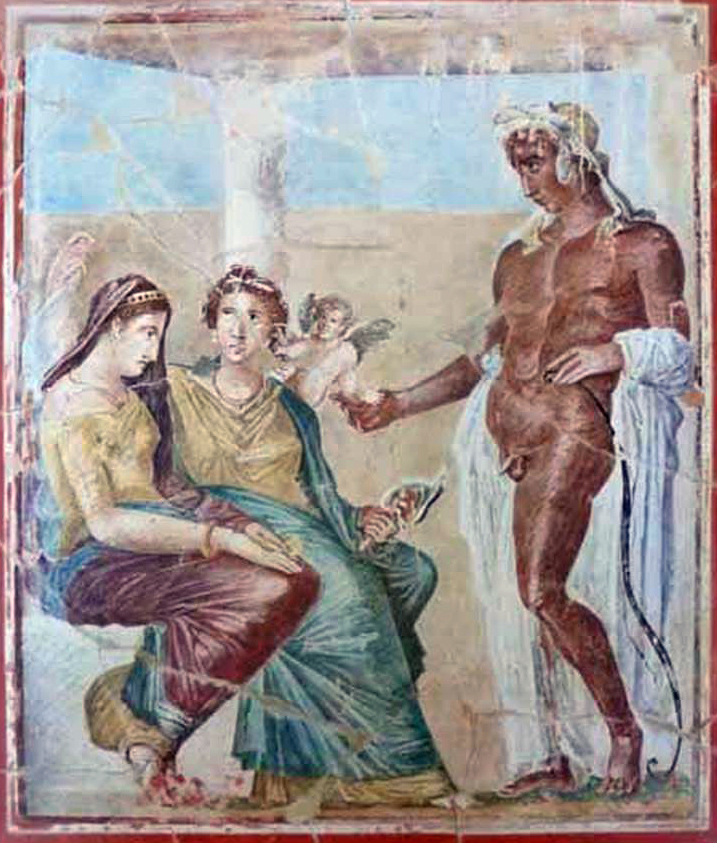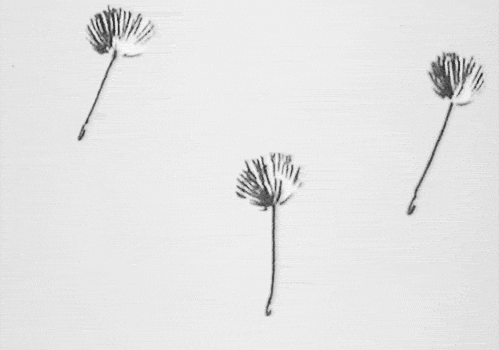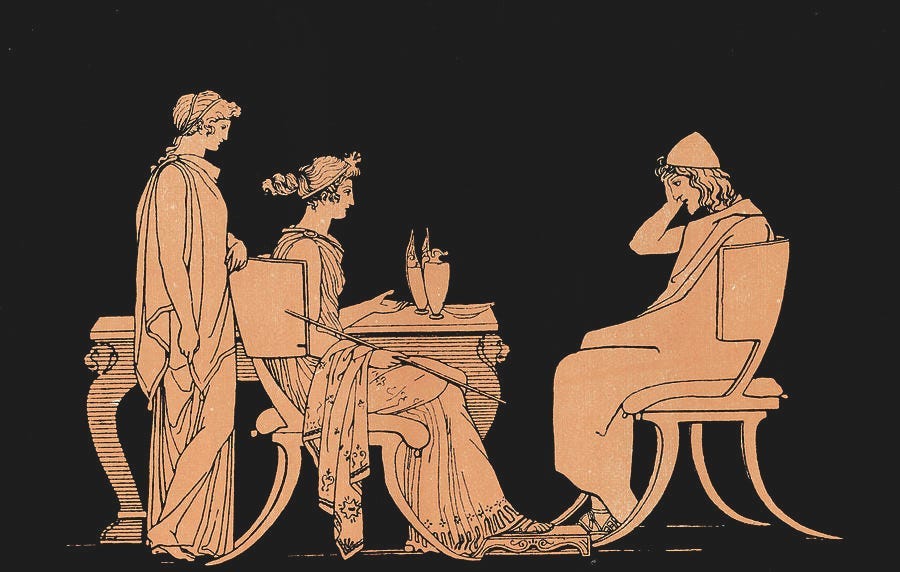 Seduction of Helen by Paris - Pompeii (100 AD)
Seduction of Helen by Paris - Pompeii (100 AD)

THE ARGUMENT
Paris, betwixt the hosts, to single fight,
Of all the Greeks, dares the most hardy knight.
King Menelaus doth accept his brave,
Conditioning that he again should have
Fair Helena, with all she brought to Troy,
If he subdu’d; else Paris should enjoy
Her, and her wealth, in peace. Conquest doth grant
Her dear wreath to the Grecian combatant;
But Venus to her champion’s life doth yield
Safe rescue, and conveys him from the field
Into his chamber, and for Helen sends,
Whom much her lover’s foul disgrace offends;
Yet Venus for him still makes good her charms,
And ends the second combat in his arms.

ANOTHER ARGUMENT
Gamma the single fight doth sing
‘Twixt Paris and the Spartan king.

When ev’ry least commander’s will best soldiers had obey’d,
And both the hosts were rang’d for fight, the Trojans would have fray’d
The Greeks with noises, crying out, in coming rudely on;
At all parts like the cranes that fill, with harsh confusion,
Of brutish clangés all the air, and in ridiculous war
(Eschewing the unsuffer’d storms, shot from the winter’s star)
Visit the ocean, and confer the Pygmei soldiers’ death.
The Greeks charg’d silent, and like men, bestow’d their thrifty breath
In strength of far-resounding blows, still entertaining care
Of either’s rescue, when their strength did their engagements dare.
And as, upon a hill’s steep tops, the south wind pours a cloud,
To shepherds thankless, but by thieves that love the night, allow’d,
A darkness letting down, that blinds a stone’s cast off men’s eyes;
Such darkness from the Greeks’ swift feet (made all of dust) did rise.
But, ere stern conflict mix’d both strengths, fair Paris stept before
The Trojan host; athwart his back a panther’s hide he wore,
A crookéd bow, and sword, and shook two brazen-headed darts;
With which well-arm’d, his tongue provok’d the best of Grecian hearts
To stand with him in single fight. Whom when the man, wrong’d most
Of all the Greeks, so gloriously saw stalk before the host;
As when a lion is rejoic’d, (with hunger half forlorn,)
That finds some sweet prey, as a hart, whose grace lies in his horn,
Or sylvan goat, which he devours, though never so pursu’d
With dogs and men; so Sparta’s king exulted, when he viewed
The fair-fac’d Paris so expos’d to his so thirsted wreak,
Whereof his good cause made him sure. The Grecian front did break,
And forth he rush’d, at all parts arm’d, leapt from his chariot,
And royally prepar’d for charge. Which seen, cold terror shot
The heart of Paris, who retir’d as headlong from the king
As in him he had shunn’d his death. And as a hilly spring
Presents a serpent to a man, full underneath his feet,
Her blue neck, swoln with poison, rais’d, and her sting out, to greet
His heedless entry, suddenly his walk he altereth,
Starts back amaz’d, is shook with fear, and looks as pale as death;
So Menelaus Paris scar’d; so that divine-fac’d foe
Shrunk in his beauties. Which beheld by Hector, he let go
This bitter check at him; “Accurs’d, made but in beauty’s scorn,
Impostor, woman’s man! O heav’n, that thou hadst ne’er been born,
Or, being so manless, never liv’d to bear man’s noblest state,
The nuptial honour! Which I wish, because it were a fate
Much better for thee than this shame. This spectacle doth make
A man a monster. Hark! how loud the Greeks laugh, who did take
Thy fair form for a continent of parts as fair. A rape
Thou mad’st of nature, like their queen. No soul, an empty shape,
Takes up thy being; yet how spite to ev’ry shade of good
Fills it with ill! for as thou art, thou couldst collect a brood
Of others like thee, and far hence fetch ill enough to us,
Ev’n to thy father; all these friends make those foes mock them thus
In thee, for whose ridiculous sake so seriously they lay
All Greece, and fate, upon their necks. O wretch! Not dare to stay
Weak Menelaus? But ’twas well; for in him thou hadst tried
What strength lost beauty can infuse, and with the more grief died
To feel thou robb’dst a worthier man, to wrong a soldier’s right.
Your harp’s sweet touch, curl’d locks, fine shape, and gifts so exquisite,
Giv’n thee by Venus, would have done your fine dames little good,
When blood and dust had ruffled them, and had as little stood
Thyself in stead; but what thy care of all these in thee flies
We should inflict on thee ourselves. Infectious cowardice
In thee hath terrified our host; for which thou well deserv’st
A coat of tombstone, not of steel in which, for form, thou serv’st.”
To this thus Paris spake, (for form, that might inhabit heav’n)
“Hector, because thy sharp reproof is out of justice giv’n,
I take it well; but though thy heart, inur’d to these affrights,
Cuts through them as an axe through oak, that more us’d more excites
The workman’s faculty, whose art can make the edge go far,
Yet I, less practis’d than thyself in these extremes of war,
May well be pardon’d, though less bold; in these your worth exceeds,
In others mine. Nor is my mind of less force to the deeds
Requir’d in war, because my form more flows in gifts of peace.
Reproach not, therefore, the kind gifts of golden Cyprides.
All heav’n’s gifts have their worthy price; as little to be scorn’d
As to be won with strength, wealth, state; with which to be adorn’d,
Some men would change state, wealth, or strength. But, if your martial heart
Wish me to make my challenge good, and hold it such a part
Of shame to give it over thus, cause all the rest to rest,
And, ’twixt both hosts, let Sparta’s king and me perform our best
For Helen and the wealth she brought; and he that overcomes,
Or proves superior any way, in all your equal dooms,
Let him enjoy her utmost wealth, keep her, or take her home;
The rest strike leagues of endless date, and hearty friends become;
You dwelling safe in gleby Troy, the Greeks retire their force
T’ Achaia, that breeds fairest dames, and Argos, fairest horse.”
He said, and his amendsful words did Hector highly please,
Who rush’d betwixt the fighting hosts, and made the Trojans cease,
By holding up in midst his lance. The Grecians noted not
The signal he for parley used, but at him fiercely shot,
Hurl’d stones, and still were leveling darts. At last the king of men,
Great Agamemnon, cried aloud: “Argives! for shame, contain;
Youths of Achaia, shoot no more; the fair-helm’d Hector shows
As he desir’d to treat with us.” This said, all ceas’d from blows,
And Hector spake to both the hosts: “Trojans, and hardy Greeks,
Hear now what he that stirr’d these wars, for their cessation seeks.
He bids us all, and you, disarm, that he alone may fight
With Menelaus, for us all, for Helen and her right,
With all the dow’r she brought to Troy; and he that wins the day,
Or is, in all the art of arms, superior any way,
The queen, and all her sorts of wealth, let him at will enjoy;
The rest strike truce, and let love seal firm leagues ’twixt Greece and Troy.”
The Greek host wonder’d at this brave; silence flew ev’rywhere;
At last spake Sparta’s warlike king: “Now also give me ear,
Whom grief gives most cause of reply. I now have hope to free
The Greeks and Trojans of all ills, they have sustain’d for me,
And Alexander, that was cause I stretch’d my spleen so far.
Of both then, which is nearest fate, let his death end the war;
The rest immediately retire, and greet all homes in peace.
Go then (to bless your champion, and give his pow’rs success)
Fetch for the Earth, and for the Sun (the Gods on whom ye call)
Two lambs, a black one and a white, a female and a male;
And we another, for ourselves, will fetch, and kill to Jove.
To sign which rites bring Priam’s force, because we well approve
His sons perfidious, envious, and (out of practis’d bane
To faith, when she believes in them) Jove’s high truce may profane.
All young men’s hearts are still unstaid; but in those well-weigh’d deeds
An old man will consent to pass things past, and what succeeds
He looks into, that he may know, how best to make his way
Through both the fortunes of a fact, and will the worst obey.”
This granted, a delightful hope both Greeks and Trojans fed,
Of long’d-for rest from those long toils, their tedious war had bred.
Their horses then in rank they set, drawn from their chariots round,
Descend themselves, took off their arms, and plac’d them on the ground,
Near one another; for the space ’twixt both the hosts was small.
Hector two heralds sent to Troy, that they from thence might call
King Priam, and to bring the lambs, to rate the truce they swore.
But Agamemnon to the fleet Talthybius sent before,
To fetch their lamb; who nothing slack’d the royal charge was giv’n.
Iris, the rain-bow, then came down, ambassadress from heav’n,
To white-arm’d Helen. She assum’d at ev’ry part the grace
Of Helen’s last love’s sister’s shape, who had the highest place
In Helen’s love, and had to name Laodice, most fair
Of all the daughters Priam had, and made the nuptial pair
With Helicaon, royal sprout of old Antenor’s seed.
She found queen Helena at home, at work about a weed,
Wov’n for herself; it shin’d like fire, was rich, and full of size,
The work of both sides being alike; in which she did comprise
The many labours warlike Troy and brass-arm’d Greece endur’d
For her fair sake, by cruel Mars and his stern friends procur’d.
Iris came in in joyful haste, and said; “O come with me,
Lov’d nymph, and an admiréd sight of Greeks and Trojans see,
Who first on one another brought a war so full of tears,
Ev’n thirsty of contentious war. Now ev’ry man forbears,
And friendly by each other sits, each leaning on his shield,
Their long and shining lances pitch’d fast by them in the field,
Paris, and Sparta’s king, alone must take up all the strife;
And he that conquers only call fair Helena his wife.”
Thus spake the thousand-colour’d Dame, and to her mind commends
The joy to see her first espous’d, her native tow’rs, and friends;
Which stirr’d a sweet desire in her: to serve the which she hied,
Shadow’d her graces with white veils, and (though she took a pride
To set her thoughts at gaze, and see, in her clear beauty’s flood,
What choice of glory swum to her yet tender womanhood)
Season’d with tears her joys to see more joys the more offence,
And that perfection could not flow from earthly excellence.
Thus went she forth, and took with her her women most of name,
Æthra, Pitthëus’ lovely birth, and Clymene, whom fame
Hath for her fair eyes memoris’d. They reach’d the Scæan Tow’rs,
Where Priam sat, to see the fight, with all his counsellors;
Panthous, Lampus, Clytius, and stout Hicetaon,
Thymœtes, wise Antenor, and profound Ucalegon;
All grave old men; and soldiérs they had been, but for age
Now left the wars; yet counsellors they were exceeding sage.
And as in well-grown woods, or trees, cold spiny grasshoppers
Sit chirping, and send voices out, that scarce can pierce our ears
For softness, and their weak faint sounds; so, talking on the tow’r,
These seniors of the people sat; who when they saw the pow’r
Of beauty, in the queen, ascend ev’n those cold-spirited peers,
Those wise and almost wither’d men, found this heat in their years,
That they were forc’d (though whispéring) to say: “What man can blame
The Greeks and Trojans to endure, for so admir’d a dame,
So many mis’ries, and so long? In her sweet count’nance shine
Looks like the Goddesses. And yet (though never so divine)
Before we boast, unjustly still, of her enforcéd prise,
And justly suffer for her sake, with all our progenies,
Labour and ruin, let her go; the profit of our land
Must pass the beauty.” Thus, though these could bear so fit a hand
On their affections, yet, when all their gravest powers were us’d,
They could not choose but welcome her, and rather they accus’d
The Gods than beauty; for thus spake the most-fam’d king of Troy:
“Come, lovéd daughter, sit by me and take the worthy joy
Of thy first husband’s sight, old friends, and princes near allied,
And name me some of these brave Greeks, so manly beautified.
Come, do not think I lay the wars, endur’d by us, on thee,
The Gods have sent them, and the tears in which they swum to me.
Sit then, and name this goodly Greek, so tall, and broadly spread,
Who than the rest, that stand by him, is higher by the head;
The bravest man I ever saw, and most majestical,
His only presence makes me think him king amongst them all.”
The fairest of her sex replied: “Most rev’rend father-in-law,
Most lov’d, most fear’d, would some ill death had seiz’d me, when I saw
The first mean why I wrong’d you thus: that I had never lost
The sight of these my ancient friends, of him that lov’d me most,
Of my sole daughter, brothers both, with all those kindly mates,
Of one soil, one age, born with me, though under diff’rent fates!
But these boons envious stars deny; the memory of these
In sorrow pines those beauties now, that then did too much please;
Nor satisfy they your demand, to which I thus reply:
That’s Agamemnon, Atreus’ son, the great in empery;
A king, whom double royalty doth crown, being great and good,
And one that was my brother-in-law, when I contain’d my blood,
And was more worthy; if at all I might be said to be,
My being being lost so soon in all that honour’d me.”

No man or woman born, coward or brave, can shun his destiny.
~ Homer
Thank you for your support of The Literary Review and for being a patron of great literature and the arts.
Best wishes!




